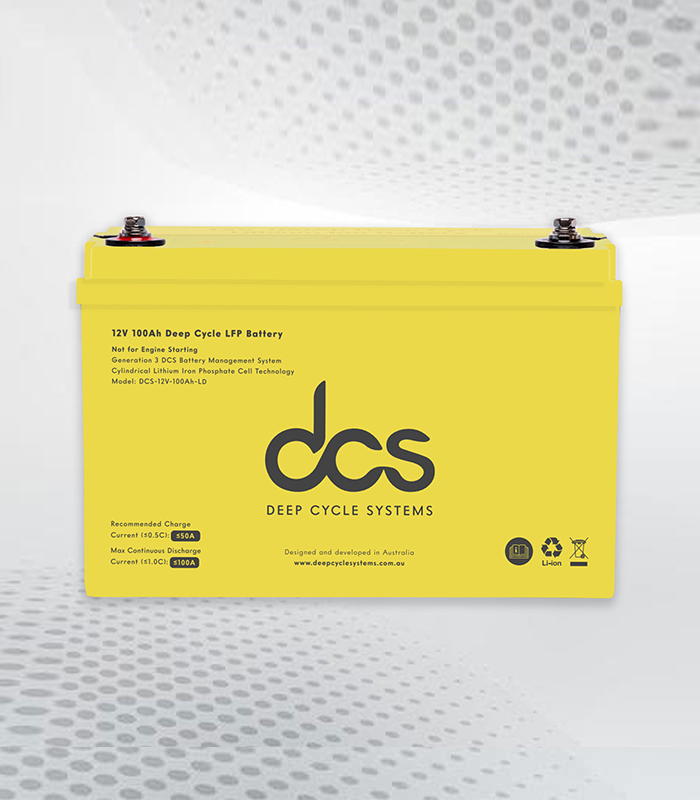When it comes to energy storage, deep-cycle batteries play a vital role in providing reliable power for a wide range of applications. One such popular option is the 12V 100Ah deep-cycle battery. This blog post will explore the evolution of energy storage through the lens of the 12V 100Ah deep-cycle battery, also known as the Deep Cycle Battery 100ah 12v or the lithium trolling motor battery 12V 100Ah.
Understanding 12v 100ah Deep Cycle Battery
12v 100ah Deep Cycle Battery systems distinguish themselves through their capability to discharge most of their stored energy without damage or significant loss in capacity, a feature not commonly found in regular starting batteries, which are optimised for short, high-energy bursts.
These batteries are integral to many applications, ranging from recreational vehicles and boats to sustainable energy setups such as solar and wind power systems. The heart of their appeal lies in their design which facilitates repeated, deep discharges followed by recharges, making them ideally suited for scenarios that demand a consistent, long-term power supply.
The construction of deep cycle batteries is tailored to endure the rigours of extensive discharge and recharge cycles. This is achieved through thicker plates and a robust build that can withstand the physical stresses of deep cycling. Unlike their starting battery counterparts, which may suffer from a shortened lifespan when deeply discharged, deep cycle batteries are engineered for resilience, allowing them to serve effectively in roles where energy needs are spread out over time rather than in sudden spikes.
This durability and versatility make the 12V 100Ah variant popular among those needing reliable energy solutions. Their unique construction and the chemistry behind them empower users with a stable and enduring source of power, crucial for off-grid living, long marine voyages, or ensuring the seamless operation of renewable energy installations.
Understanding the foundational principles that underpin deep-cycle batteries illuminates why they are an indispensable component in a wide array of power storage and supply scenarios.
The Mechanics of the 12v 100 Amp Hour Deep Cycle Battery
Delving into the mechanics of the 12v 100 Amp Hour Deep Cycle Battery unveils a sophisticated design structured to meet demanding energy requirements with unwavering consistency.
With its substantial 100 amp-hour capacity, this battery variant is engineered to discharge and recharge over numerous cycles without significant degradation, thus standing as a bulwark of reliability for various applications. At its core, the battery consists of multiple cells working in unison, each contributing to the output voltage and capacity through a carefully balanced chemical reaction.
The architecture of these batteries incorporates denser heavy-duty plates than those found in standard batteries, enhancing their ability to endure prolonged discharge cycles. This attribute is crucial for applications requiring a steady and enduring power supply, allowing devices and systems to function optimally over extended periods without requiring frequent recharges.
In integrating these components, the 12-v 100ah Deep Cycle Battery exemplifies a harmonious blend of robustness and technological sophistication, making it an indispensable asset for sustained energy delivery in diverse settings. The meticulous design and engineering behind this battery model underscore its significance in energy storage, paving the way for a future where reliable and efficient power is paramount.
Advantages of Using a 12 Volt 100 Amp Deep Cycle Battery
Opting for a 12 volt 100 amp deep cycle battery confers several distinct benefits, paramount among these is its exemplary resilience to deep discharge cycles. Unlike standard batteries, which may falter under the strain of frequent, intense energy withdrawals, these deep cycle variants maintain their performance over many cycles. This robustness ensures they are exceptionally suited to applications where the battery is regularly drawn down to a low charge before recharging.
Additionally, the 12-v 100ah Deep Cycle Battery’s versatility extends to its adaptability across a broad spectrum of climates and conditions. Engineered to withstand both high and low temperatures, these batteries demonstrate superior performance regardless of the environmental stresses they are subjected to. This feature is particularly advantageous for outdoor or rugged applications, where exposure to variable weather conditions is commonplace.
Moreover, their capacity for deep discharges without compromising battery life or efficiency benefits the user and promotes a more sustainable approach to energy use. By enabling the efficient use of stored power, these batteries contribute to reducing waste and the demand on traditional energy sources, aligning with broader environmental sustainability goals.
Applications of the 12-v 100ah Deep Cycle Battery
The versatility of the 12-v 100ah Deep Cycle Battery extends across a spectrum of uses, making it a linchpin in numerous settings where reliable energy is indispensable. In the realm of recreational pursuits, this battery variant shines, providing the lifeline for electrical systems in caravans and motorhomes, ensuring amenities and comforts of home are powered seamlessly whilst on the move.
Similarly, marine enthusiasts find an invaluable ally in these batteries, as they ensure navigation systems, lighting, and on-board appliances maintain functionality during extensive voyages, where power reliability is paramount.
In addition to these applications, this battery type is frequently employed in off-grid living setups and remote industrial operations, where access to conventional power sources is limited or non-existent.
Its robustness and reliability ensure that critical systems remain operational, underpinning the essential services and functions required in these contexts. The breadth of its applications showcases not just the technological prowess embedded in the 12V 100Ah deep-cycle battery but also its critical role in powering a future where flexibility and sustainability are at the forefront of energy solutions.
Maintenance Tips for Your 12 Volt 100ah Deep Cycle Battery
Adopting a rigorous maintenance routine is essential to maximise the lifespan and efficiency of your 12 Volt 100ah Deep Cycle Battery. Regularly inspect the battery for any signs of wear or damage, ensuring the connections are clean, tight, and corrosion-free. If you’re using a flooded lead-acid type, keeping the electrolyte levels adequately topped up with distilled water is critical, but avoid overfilling as this could lead to issues.
- For those with sealed batteries, such as AGM (Absorbent Glass Mat) or Gel varieties, there’s no need to check fluid levels, but it’s still vital to ensure that they are charged correctly and stored in suitable conditions. Keeping the battery at a consistent charge prevents sulphation, a detrimental process that can significantly impair battery performance and longevity.
- Furthermore, employing a smart charger that can adjust the charge according to the battery’s condition can significantly extend its service life. These chargers help maintain an optimal charge, reducing the risk of overcharging or undercharging, which can be harmful over time.
- In colder climates, storing batteries in a frost-free environment is advisable to prevent damage from freezing. Conversely, providing a shaded or cool storage area in hotter conditions can help mitigate heat-related wear.
By following these maintenance practices, you are not only ensuring the reliable operation of your 12-v 100ah Deep Cycle Battery but also contributing to the sustainability of your energy solution by extending its productive lifespan.
The Future of Energy Storage: Lithium Trolling Motor Battery 12v 100ah
Lithium batteries are setting the pace for innovation and efficiency as the energy storage landscape continues to evolve. Distinctively, the Lithium Trolling Motor Battery 12v 100ah exemplifies the significant strides in battery technology, showcasing superior energy density and a faster recharge rate than its lead-acid counterparts.
- This leap in technological advancement presents a transformative potential for many applications, from enhancing the performance of electric vehicles to bolstering the reliability and efficiency of renewable energy systems.
- Lithium batteries are characterised by their longevity and robustness, which stem from their unique chemical composition and structure. These batteries are less prone to the dreaded ‘memory effect’. They can maintain their capacity over many charging cycles, making them a more sustainable option in the long run. Additionally, their lightweight nature is a boon for portable and mobile applications, where reducing physical burden is paramount.
- However, the transition to lithium technology involves considering initial cost implications. Despite a higher upfront investment, the lifecycle cost analysis favours lithium batteries due to their extended lifespan and reduced maintenance needs. This economic perspective, combined with environmental benefits such as reduced carbon footprint and recyclability, underlines the integral role lithium batteries are poised to play in the future of energy storage.
Embracing lithium battery technology reflects a commitment to advancing renewable energy solutions and optimising energy storage in an era where efficiency and sustainability are increasingly crucial.
How to Choose the Right 12V 100Ah Battery for Your Needs
Selecting the ideal 12-v 100ah Deep Cycle Battery requires a comprehensive evaluation of your requirements, energy demands, and financial parameters. It’s paramount to ascertain the battery’s primary application—be it marine use, RVs, off-grid solar systems, or backup power solutions. Each scenario has distinct power needs and operational conditions significantly influencing battery performance and suitability.
Understanding the technology behind the battery is also crucial. Lead-acid batteries, including AGM and Gel types, offer reliability and value for money, making them suitable for various applications. However, for those prioritising weight, efficiency, and a longer lifespan, lithium batteries, despite their higher initial cost, might represent a more cost-effective solution over time due to their superior energy density, quicker recharge rates, and reduced maintenance.
Considering the environment in which the battery will operate is essential. Extreme temperatures can affect battery performance and lifespan. Some batteries are better equipped to handle severe cold or hot climates, so look for options that promise durability within your specific environmental conditions.
The Impact of 12V 100Ah Batteries on Renewable Energy
Incorporating 12V 100Ah deep cycle batteries into renewable energy systems signifies a pivotal advancement towards more sustainable and efficient energy practices. These batteries, capable of enduring numerous discharge and recharge cycles, are instrumental in harnessing and storing energy derived from natural sources such as the sun and wind.
- Their high capacity and durability enable the accumulation of excess energy during peak production periods, which can then be utilised during times of low generation or elevated demand. This capability enhances the operational reliability of renewable energy installations and contributes significantly to the grid’s stability.
- In the context of solar and wind energy systems, the role of 12V 100Ah batteries is transformative. They facilitate a shift towards energy autonomy by allowing households and businesses to store surplus energy, reducing reliance on conventional power grids and diminishing the overall carbon footprint.
- The strategic deployment of these batteries in renewable energy setups fosters a more flexible and resilient energy infrastructure, capable of adapting to varying environmental conditions and energy requirements.
Crucially, using 12V 100Ah deep cycle batteries in renewable energy contexts underscores a commitment to environmental stewardship. By enabling more efficient use of renewable resources, these batteries are at the forefront of efforts to combat climate change, making a tangible contribution towards a more sustainable and renewable-powered future.
FAQs
How long should I expect my Deep Cycle Battery 100ah 12v to last?
The longevity of a Deep Cycle Battery 100ah 12v varies based on its maintenance, frequency of use, and overall quality. Typically, these batteries can efficiently serve for approximately 3 to 5 years with proper care. Ensuring optimal maintenance routines and avoiding deep discharges can significantly prolong their lifespan.
Is a Deep Cycle Battery 100ah 12v appropriate for powering an off-grid solar setup?
The Lithium Trolling Motor Battery 12v 100ah is an excellent choice for off-grid solar systems. Its capacity to handle repeated discharge and recharge cycles makes it ideal for storing solar power, ensuring a consistent energy supply to meet your requirements.
What is the correct method for disposing of a 12v 100ah Deep Cycle Battery once it reaches the end of its life?
Properly disposing 12V 100Ah deep cycle batteries is crucial to prevent environmental damage. Many recycling centres are equipped to handle old batteries responsibly. It is advised to contact your local waste management or recycling centre to find out the best way to recycle or dispose of your battery by local regulations.
Conclusion
To wrap up, the significance of the Lithium Trolling Motor Battery 12v 100ah in modern energy solutions cannot be overstated. Its adaptability across diverse applications, from enhancing the comforts of recreational vehicles to playing a pivotal role in renewable energy systems, underscores its value. As technology progresses, particularly with the advent of lithium batteries, the capabilities and efficiency of these power sources are set to reach new heights. Selecting the appropriate battery tailored to your specific needs ensures an optimisation of performance and contributes to a more sustainable and efficient energy future.










